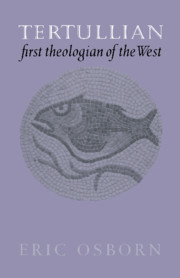Book contents
- Frontmatter
- Contents
- Preface
- Note on the text and list of abbreviations
- 1 Simplicity and perfection
- 2 The puzzle: Athens and Jerusalem
- 3 The paradox: credible because inept
- 4 Strife of opposites and faith as recognition
- 5 Antithesis in one God: ‘Against Marcion’
- 6 Trinity and christology
- 7 Prayer and the bible
- 8 Mankind's two natures and a sordid church
- 9 Argument and humour: Hermogenes and the Valentinians
- 10 Promise of laughter, judgement of hell: apocalyse and system
- 11 Ethics of conflict
- Conclusion
- Select bibliography
- Subject index
- Citations from Tertullian
- Citations from the Bible
3 - The paradox: credible because inept
Published online by Cambridge University Press: 09 November 2009
- Frontmatter
- Contents
- Preface
- Note on the text and list of abbreviations
- 1 Simplicity and perfection
- 2 The puzzle: Athens and Jerusalem
- 3 The paradox: credible because inept
- 4 Strife of opposites and faith as recognition
- 5 Antithesis in one God: ‘Against Marcion’
- 6 Trinity and christology
- 7 Prayer and the bible
- 8 Mankind's two natures and a sordid church
- 9 Argument and humour: Hermogenes and the Valentinians
- 10 Promise of laughter, judgement of hell: apocalyse and system
- 11 Ethics of conflict
- Conclusion
- Select bibliography
- Subject index
- Citations from Tertullian
- Citations from the Bible
Summary
My books, at this epoch [wrote a modern novelist] if they did not actually serve to irritate the disorder, partook, it will be perceived, largely, in their imaginative and inconsequential nature, of the characteristic qualities of the disorder itself. I well remember, among others, … Tertullian's ‘DeCarne Christi’ … in which the unintelligible sentence, ‘Mortuus est Deifilius; credibile est quia ineptum est; et sepultus resurrexit; certum est quia impossible est [The son of God has died: this is believable because it is silly; buried he has risen again: this is certain because it is impossible] …’ occupied my undivided time, for many weeks of laborious and fruitless investigation.
Others have been less fortunate, because their fruitful investigations produced clear, but false, results which have encouraged irrational piety.
Tertullian is famous for his paradox (carn. 5.4), which is commonly misquoted and seen as the archetype of irrational faith. Yet his most assiduous modern editor and translator writes, ‘This is one of the most lucid sections of Tertullian's work, in which his Latin flows with unwonted ease and perspicuity.’ Is this claim, asks another, ‘unconscious humour’? Some writers take the passage by itself and find irrationalism, while others look at the context and find rational argument. A refrain of the treatise is ‘But here again I demand reasons’ (carn. 10.1).
Tertullian's paradox is a cruel test for sorting out those who analyse arguments from those who do not. Most error is caused by the attempt to use the paradox in settings where it does not belong.
- Type
- Chapter
- Information
- Tertullian, First Theologian of the West , pp. 48 - 64Publisher: Cambridge University PressPrint publication year: 1997
- 1
- Cited by



